The global risk management market is estimated to grow from USD 17.5 billion in 2025 to approximately USD 68.4 billion by 2035, recording an absolute increase of USD 50.9 billion over the forecast period. This translates into a total growth of 290.9%, with the market forecast to expand at a compound annual growth rate (CAGR) of 14.6% between 2025 and 2035. The overall market size is expected to grow by nearly 3.9X during the same period, supported by the rising adoption of digital transformation initiatives and increasing demand for comprehensive risk assessment solutions across various industries following growing regulatory requirements and cybersecurity threats.
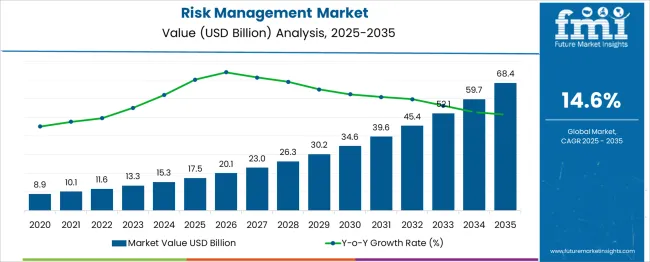
Between 2025 and 2030, the risk management market is projected to expand from USD 17.5 billion to USD 30.2 billion, resulting in a value increase of USD 12.7 billion, which represents 25.0% of the total forecast growth for the decade. This phase of growth will be shaped by rising adoption of cloud-based risk management solutions, increasing regulatory compliance requirements, and growing awareness among organizations about the importance of proactive risk identification and mitigation. Companies are investing in comprehensive risk management platforms to address evolving cybersecurity threats and operational challenges.
From 2030 to 2035, the market is forecast to grow from USD 30.2 billion to USD 68.4 billion, adding another USD 38.2 billion, which constitutes 75.0% of the overall ten-year expansion. This period is expected to be characterized by expansion of artificial intelligence and machine learning capabilities in risk assessment, integration of advanced analytics for predictive risk modeling, and development of industry-specific risk management solutions. The growing complexity of business operations and increasing focus on enterprise-wide risk governance will drive demand for more sophisticated risk management technologies and comprehensive consulting services.
Between 2020 and 2025, the risk management market experienced significant expansion, driven by increasing digitalization of business processes and heightened awareness of operational and cybersecurity risks following global disruptions. The market evolved as organizations recognized the critical importance of integrated risk management frameworks for ensuring business continuity and compliance with regulations. Financial institutions and technology companies have begun to emphasize comprehensive risk assessment capabilities and real-time monitoring solutions to maintain operational resilience and stakeholder confidence.
| Market | Value |
|---|---|
| Risk Management (2025) | USD 17.5 billion |
| Risk Management (2035) | USD 68.4 billion |
| Forecast CAGR (2025-2035) | 14.6% |
Market expansion is being supported by the increasing complexity of business operations and regulatory environments worldwide, creating corresponding demand for comprehensive risk identification, assessment, and mitigation solutions. Organizations across various industries are implementing integrated risk management frameworks that provide visibility into potential threats and enable proactive response strategies. Regulatory bodies are establishing stringent compliance requirements that mandate documented risk assessment procedures and continuous monitoring capabilities across financial services, healthcare, manufacturing, and other sectors.
The growing frequency and sophistication of cybersecurity threats are driving demand for specialized risk management solutions that can identify vulnerabilities and protect critical business assets. Companies are adopting comprehensive risk management platforms that integrate cybersecurity risk assessment with operational risk monitoring and regulatory compliance management. The increasing adoption of cloud technologies and digital transformation initiatives is creating new risk categories that require specialized monitoring and mitigation approaches, driving market growth for advanced risk management solutions.
The market is segmented by component outlook, deployment outlook, risk type outlook, organization size outlook, end use outlook, and region. By component outlook, the market includes solutions and services. Based on deployment outlook, the market is categorized into cloud-based and on-premises. In terms of risk type outlook, the market is segmented into financial risk management, compliance risk management, cybersecurity risk management, enterprise risk management, operational risk management, and others. By organization size outlook, the market is classified into large enterprises and small and medium-sized enterprises. By end use outlook, the market is divided into BFSI, IT & telecom, government defense and aerospace, healthcare & life science, retail & consumer goods, manufacturing, professional services, energy & utilities, and others. Regionally, the market is divided into North America, Europe, East Asia, South Asia & Pacific, Latin America, and Middle East & Africa.
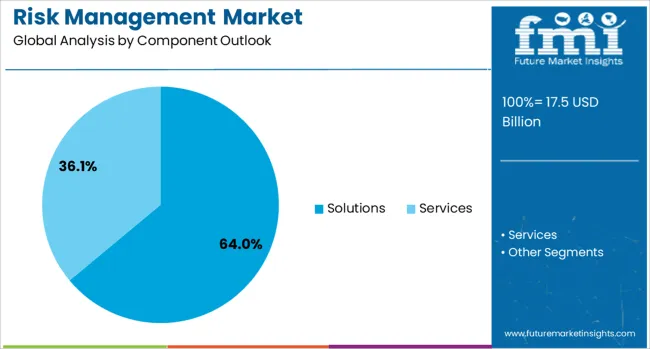
Solutions are projected to account for 63.95% of the risk management market in 2025. This leading share is supported by the widespread adoption of integrated risk management platforms that provide comprehensive risk assessment, monitoring, and reporting capabilities across various business functions. Risk management solutions offer automated risk identification, real-time monitoring, and advanced analytics that enable organizations to proactively manage potential threats and maintain regulatory compliance. The segment benefits from continuous technological innovation and the development of industry-specific risk management applications that address diverse organizational requirements.
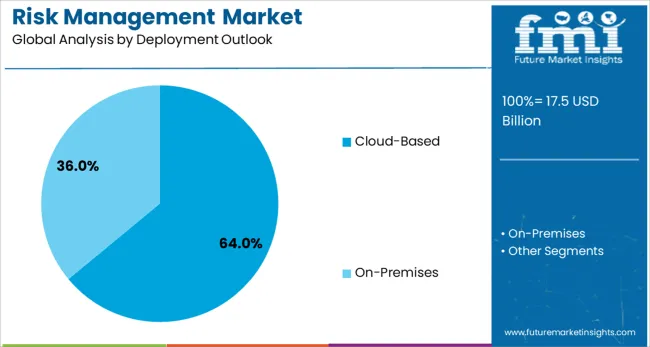
Cloud-based deployment is expected to represent 64% of the risk management market in 2025. This dominant share reflects the growing preference for scalable, cost-effective risk management solutions that can be rapidly deployed and easily updated to address evolving threat landscapes. Cloud-based risk management platforms offer enhanced accessibility, real-time collaboration capabilities, and reduced infrastructure requirements compared to traditional on-premises solutions. The segment benefits from the increasing adoption of cloud technologies across various industries and the availability of comprehensive security measures that protect sensitive risk management data.
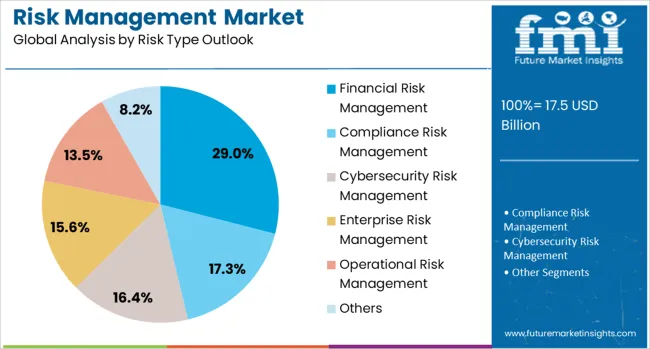
Financial risk management is projected to contribute 29% of the market in 2025, representing the largest single risk category due to the critical importance of financial stability and regulatory compliance across all industries. Financial risk management solutions address credit risk, market risk, operational risk, and liquidity risk through comprehensive monitoring and assessment capabilities. The segment is supported by stringent regulatory requirements in the financial services industry and the growing complexity of global financial markets that require sophisticated risk modeling and analysis tools.
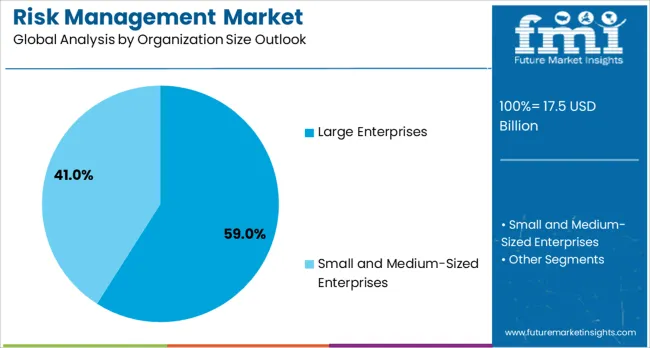
Large enterprises are estimated to hold 59% of the market share in 2025. This dominance reflects the extensive risk management requirements of large organizations that operate across multiple business units, geographic regions, and regulatory environments. Large enterprises typically face complex risk profiles that require comprehensive, integrated risk management solutions capable of addressing diverse operational, financial, and compliance challenges. The segment provides stable demand for advanced risk management platforms through ongoing regulatory compliance requirements and the need for enterprise-wide risk governance frameworks.
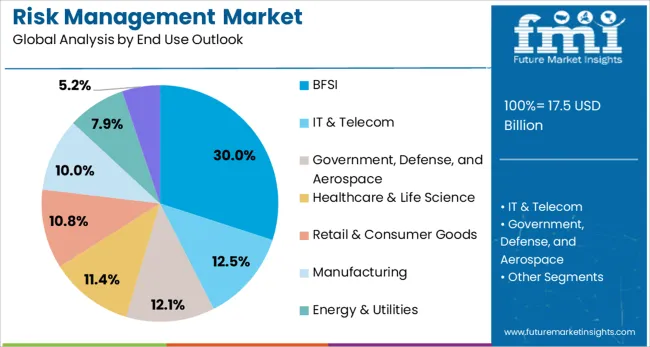
Banking, Financial Services, and Insurance (BFSI) sector is estimated to hold 30% of the market share in 2025. This significant share reflects the highly regulated nature of the financial services industry and the critical importance of comprehensive risk management for maintaining operational stability and regulatory compliance. BFSI organizations face diverse risk categories, including credit risk, market risk, operational risk, and cybersecurity risk, requiring sophisticated monitoring and assessment capabilities. The segment benefits from stringent regulatory frameworks and the need for real-time risk monitoring to maintain stakeholder confidence and regulatory approval.
The risk management market is advancing rapidly due to increasing regulatory requirements and growing awareness of operational risks across various industries. The market faces challenges including implementation complexity in legacy systems, need for specialized expertise in risk assessment methodologies, and varying regulatory requirements across different geographic regions. Technology integration and standardization efforts continue to influence solution development and market adoption patterns.
The growing deployment of artificial intelligence and machine learning capabilities is enabling automated risk identification, predictive risk modeling, and enhanced threat detection across various risk categories. AI-powered risk management solutions provide real-time analysis of large datasets and can identify patterns that indicate potential risks before they materialize into significant threats. These technologies are particularly valuable for cybersecurity risk management and fraud detection applications where rapid response capabilities are critical for minimizing potential damage.
Modern risk management platforms are incorporating industry-specific functionality and regulatory compliance features that address unique risk profiles across different sectors. Healthcare organizations require specialized solutions for patient data protection and regulatory compliance, while manufacturing companies need operational risk monitoring and supply chain risk assessment capabilities. Industry-specific solutions provide targeted functionality and compliance features that enhance risk management effectiveness and reduce implementation complexity for specialized applications.
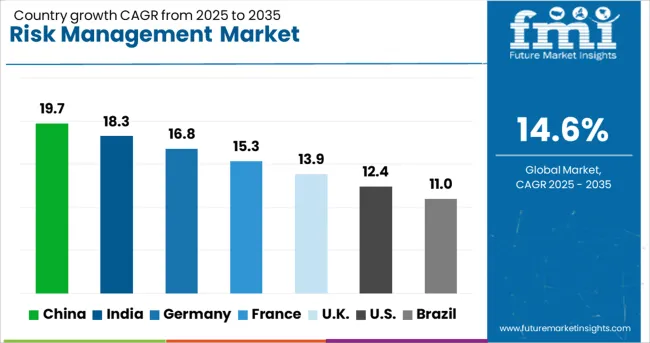
| Countries | CAGR (%) |
|---|---|
| China | 19.7 |
| India | 18.2 |
| Germany | 16.7 |
| France | 15.3 |
| United Kingdom | 13.8 |
| United States | 12.4 |
| Brazil | 10.9 |
The risk management market demonstrates significant variation in growth rates across major economies, reflecting differences in digital adoption, regulatory frameworks, and sectoral priorities. China leads with the highest CAGR of 19.7%, driven by rapid digital transformation, stringent regulatory requirements, and robust expansion in financial services and technology sectors. India follows closely at 18.2%, supported by growing digital banking adoption, cybersecurity initiatives, and IT sector expansion. Germany grows at 16.7%, emphasizing manufacturing excellence, regulatory compliance, and operational risk monitoring. France records 15.3%, fueled by financial services and aerospace industry risk management needs. The UK achieves 13.8% growth, focusing on cybersecurity and integrated governance frameworks. The USA grows steadily at 12.4%, supported by enterprise-wide risk management and regulatory compliance initiatives. Brazil shows emerging potential with a CAGR of 10.9%, driven by financial services modernization and adoption of digital risk management solutions.
Revenue from risk management in China is projected to exhibit strong growth with a CAGR of 19.7% through 2035, driven by rapid digital transformation initiatives and increasing regulatory requirements for risk assessment across financial services and technology sectors. The country's expanding financial services industry and growing emphasis on cybersecurity risk management are creating significant demand for comprehensive risk management solutions. Major organizations are implementing integrated risk management platforms that address operational, compliance, and cybersecurity risks across urban and rural business environments.
China's technology sector modernization and financial services expansion are supporting the development of advanced risk management capabilities and regulatory compliance programs that meet international standards. Government initiatives emphasizing data protection and operational resilience are driving demand for documented risk assessment procedures and continuous monitoring capabilities. The growing complexity of business operations and international trade relationships is creating additional opportunities for enterprise risk management applications and specialized consulting services.
Revenue from risk management in India is expanding at a CAGR of 18.2%, supported by rapid financial services sector development and increasing adoption of digital banking technologies across urban and rural markets. The country's expanding information technology industry and growing emphasis on cybersecurity risk management are driving demand for comprehensive risk assessment solutions. Organizations are implementing integrated risk management frameworks that address operational risks, regulatory compliance requirements, and cybersecurity threats in diverse business environments.
India's technology sector growth and financial inclusion initiatives are facilitating adoption of advanced risk management solutions and professional training programs that meet international quality standards. The growing emphasis on digital payments and financial technology innovation is creating demand for specialized cybersecurity risk management systems and real-time monitoring capabilities. Professional certification programs and industry standards development are enhancing technical expertise among risk management professionals and enabling comprehensive risk assessment services.
Demand for risk management in Germany is projected to grow at a CAGR of 16.7%, supported by the country's emphasis on manufacturing excellence and comprehensive financial services regulatory frameworks. German organizations prioritize operational risk management and regulatory compliance across automotive, chemical, and financial services industries. The market is characterized by focus on precision risk assessment, advanced analytics integration, and compliance with comprehensive data protection and operational risk regulations.
Germany's manufacturing sector leadership and financial services innovation require extensive risk management capabilities to maintain operational efficiency and regulatory compliance standards. Organizations are implementing advanced risk management platforms that support Industry 4.0 initiatives and provide comprehensive monitoring of supply chain risks, operational hazards, and cybersecurity threats. Professional certification programs ensure specialized expertise among risk management professionals, enabling comprehensive risk assessment services and regulatory compliance support.
Demand for risk management in France is expanding at a CAGR of 15.3%, driven by the country's well-established financial services sector and aerospace industry risk assessment requirements. French organizations maintain comprehensive risk management protocols across banking, insurance, and manufacturing industries that require extensive regulatory compliance and operational risk monitoring. The market benefits from regulatory requirements that mandate documented risk assessment procedures and ongoing compliance monitoring across diverse business sectors.
France's aerospace and defense industry creates stable demand for specialized risk management solutions that meet international security standards and operational requirements. Financial services organizations are implementing advanced risk management technologies and comprehensive documentation systems that support regulatory compliance and stakeholder confidence objectives. Professional development programs and industry standards ensure technical expertise among risk management professionals in specialized applications and regulatory compliance procedures.
Demand for risk management in the UK is projected to grow at a CAGR of 13.8%, supported by the country's leadership in financial services innovation and comprehensive cybersecurity risk assessment requirements. British organizations implement extensive risk management protocols that ensure regulatory compliance and maintain operational resilience across banking, insurance, and technology sectors. The market is characterized by emphasis on comprehensive risk governance frameworks and integrated monitoring systems that support business continuity and stakeholder confidence.
The UK's financial services sector prioritizes advanced risk management capabilities through comprehensive regulatory compliance programs and cybersecurity risk assessment initiatives. Organizations are implementing integrated risk management platforms and automated monitoring systems that enhance operational resilience and regulatory reporting capabilities. Professional training and certification programs develop specialized expertise among risk management professionals, enabling comprehensive risk assessment services and regulatory compliance support.
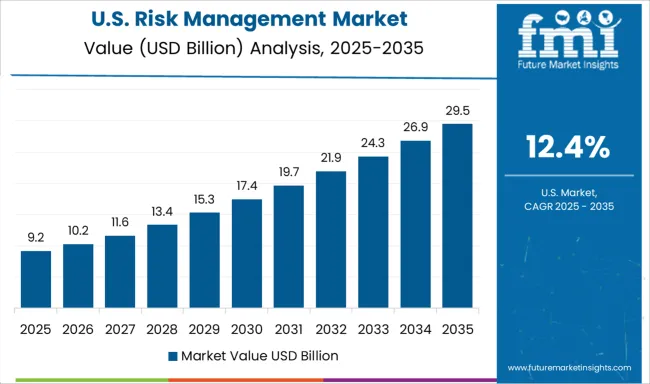
Demand for risk management in the USA is expanding at a CAGR of 12.4%, driven by comprehensive regulatory requirements and emphasis on enterprise-wide risk governance frameworks across various industries. American organizations implement extensive risk management protocols that ensure regulatory compliance and maintain operational resilience across financial services, healthcare, and technology sectors. The market benefits from established regulatory frameworks and compliance requirements that mandate documented risk assessment procedures and continuous monitoring programs.
The USA business environment emphasizes comprehensive risk management capabilities through integrated governance frameworks and automated compliance reporting systems. Organizations are implementing advanced risk management platforms that support regulatory compliance, operational risk monitoring, and cybersecurity threat assessment across diverse business units. Professional certification programs and industry standards ensure technical expertise among risk management professionals in specialized applications and regulatory compliance procedures.
Revenue from risk management in Brazil is growing at a CAGR of 10.9%, driven by financial services sector modernization and increasing adoption of digital banking technologies across domestic and international markets. The country's expanding financial technology sector and growing emphasis on regulatory compliance are creating demand for comprehensive risk management solutions. Organizations are implementing integrated risk management frameworks that address operational risks, regulatory requirements, and cybersecurity threats in evolving business environments.
Brazil's financial services modernization initiatives are facilitating adoption of advanced risk management technologies and professional training programs that meet international standards. The growing emphasis on digital financial services and regulatory compliance is creating opportunities for specialized risk management solutions and automated monitoring capabilities. Professional development programs and regulatory harmonization efforts are enhancing risk management expertise and enabling comprehensive compliance services.
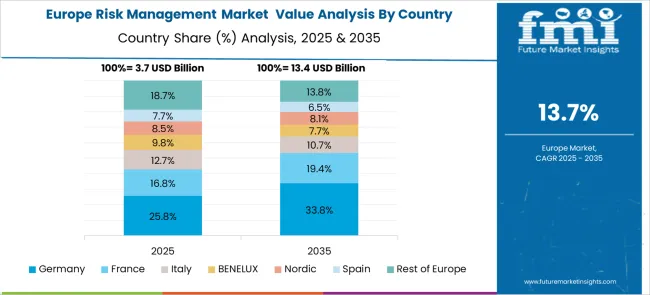
The European risk management market is expanding steadily, driven by strong regulatory frameworks, GDPR compliance, and advanced business infrastructure. Germany leads with advanced risk assessment in banking, insurance, and manufacturing, while France emphasizes regulatory compliance across financial services, pharmaceuticals, and aerospace. The UK focuses on cybersecurity and operational resilience post-Brexit, and Italy strengthens risk monitoring in banking and manufacturing. Spain invests in financial services and energy sector risk management. Nordic countries prioritize cybersecurity and operational continuity, BENELUX emphasizes integrated compliance, and Eastern Europe shows growing potential through regulatory harmonization and infrastructure development, collectively driving demand for advanced risk management solutions.
The risk management market is defined by competition among established technology companies, specialized risk management solution providers, and emerging fintech innovators. Companies are investing in artificial intelligence capabilities, cloud-based platforms, industry-specific solutions, and professional consulting services to deliver comprehensive, scalable, and cost-effective risk management solutions. Strategic partnerships, technological innovation, and geographic expansion are central to strengthening product portfolios and market presence.
IBM Corporation, USA-based, offers comprehensive risk management solutions with focus on artificial intelligence, advanced analytics, and integrated governance capabilities for enterprise applications. Microsoft Corporation, operating globally, provides cloud-based risk management platforms integrated with business productivity and security solutions. BitSight delivers specialized cybersecurity risk assessment services with emphasis on third-party risk monitoring and threat intelligence. FIS Global offers financial services risk management solutions with comprehensive regulatory compliance and operational risk capabilities.
Fiserv provides banking and financial services risk management platforms with emphasis on payment processing risk and regulatory compliance. LogicGate Inc. delivers governance, risk, and compliance solutions with focus on workflow automation and integrated risk assessment. Moody's Corporation offers risk assessment and credit analysis services with comprehensive financial risk modeling capabilities. NAVEX Global, Riskonnect Inc., ServiceNow, Oracle Corporation, MetricStream, SAS Institute Inc., and Qualys Inc. provide specialized risk management expertise, comprehensive platform solutions, and industry-specific capabilities across global and regional markets.
| Item | Value |
|---|---|
| Quantitative Units | USD 68.4 billion |
| Component Outlook | Solutions, Services |
| Deployment Outlook | Cloud-Based, On-Premises |
| Risk Type Outlook | Financial Risk Management, Compliance Risk Management, Cybersecurity Risk Management, Enterprise Risk Management, Operational Risk Management, Others |
| Organization Size Outlook | Large Enterprises, Small and Medium-Sized Enterprises |
| End Use Outlook | BFSI, IT & Telecom, Government Defense and Aerospace, Healthcare & Life Science, Retail & Consumer Goods, Manufacturing, Professional Services, Energy & Utilities, Others |
| Regions Covered | North America, Europe, East Asia, South Asia & Pacific, Latin America, Middle East & Africa |
| Country Covered | United States, Germany, India, China, United Kingdom, France, Brazil |
| Key Companies Profiled | IBM Corporation, Microsoft Corporation, BitSight, FIS Global, Fiserv, LogicGate Inc., Moody's Corporation, NAVEX Global, Riskonnect Inc., ServiceNow, Oracle Corporation, MetricStream, SAS Institute Inc., Qualys Inc. |
| Additional Attributes | Dollar sales by component outlook, deployment outlook, risk type outlook, organization size outlook, and end use outlook, regional demand trends across North America, Europe, and Asia-Pacific, competitive landscape with established technology companies and specialized risk management solution providers, organizational preferences for cloud-based versus on-premises deployment models, integration with artificial intelligence and machine learning technologies, innovations in industry-specific risk management capabilities and automated compliance reporting systems, and adoption of integrated risk management platforms with enhanced analytics and real-time monitoring features. |
The global risk management market is estimated to be valued at USD 17.5 billion in 2025.
The market size for the risk management market is projected to reach USD 68.4 billion by 2035.
The risk management market is expected to grow at a 14.6% CAGR between 2025 and 2035.
The key product types in risk management market are solutions, _risk assessment & analysis, _risk control & monitoring, _risk reporting & analytics, _others, services, _professional services and _managed services.
In terms of deployment outlook , cloud-based segment to command 64.0% share in the risk management market in 2025.






Full Research Suite comprises of:
Market outlook & trends analysis
Interviews & case studies
Strategic recommendations
Vendor profiles & capabilities analysis
5-year forecasts
8 regions and 60+ country-level data splits
Market segment data splits
12 months of continuous data updates
DELIVERED AS:
PDF EXCEL ONLINE
Insider Risk Management Market Size and Share Forecast Outlook 2025 to 2035
Third-Party Risk Management Market Size and Share Forecast Outlook 2025 to 2035
AI-Driven Treasury & Risk Management – Future-Proofing Finance
Financial Services Operational Risk Management Solution Market
Risk-based Authentication (RBA) Market
Frisket Masking Film Market
Legal, Risk and Compliance Solution Market Forecast and Outlook 2025 to 2035
Digital Risk Protection Platform Market Analysis by Solution, Enterprise Size, Industry and Region Through 2035
Global Clinical Risk Grouping Solution Market Insights – Trends & Forecast 2024-2034
Arc Flash Risk Assessment Market Size and Share Forecast Outlook 2025 to 2035
Construction Risk Assessment Software Market Size and Share Forecast Outlook 2025 to 2035
Tax Management Market Size and Share Forecast Outlook 2025 to 2035
Key Management as a Service Market
Cash Management Supplies Packaging Market Size and Share Forecast Outlook 2025 to 2035
Fuel Management Software Market Size and Share Forecast Outlook 2025 to 2035
SBOM Management and Software Supply Chain Compliance Market Analysis - Size, Share, and Forecast Outlook 2025 to 2035
Case Management Software (CMS) Market Size and Share Forecast Outlook 2025 to 2035
Farm Management Software Market Size and Share Forecast Outlook 2025 to 2035
Lead Management Market Size and Share Forecast Outlook 2025 to 2035
Pain Management Devices Market Growth - Trends & Forecast 2025 to 2035

Thank you!
You will receive an email from our Business Development Manager. Please be sure to check your SPAM/JUNK folder too.
Chat With
MaRIA